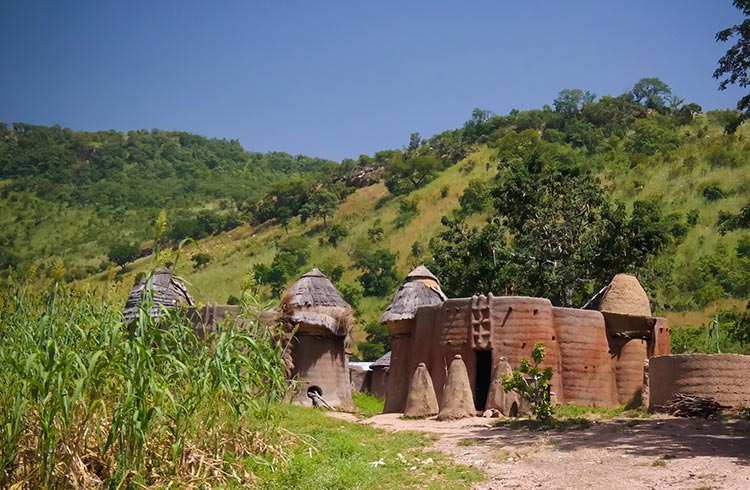Is Togo Safe To Visit? What Travelers Need to Know
This West African country is experiencing political instability and poverty. But just how dangerous is Togo for travelers? Here's what you need to know.
 Photo © Getty Images/HomoCosmicos
Photo © Getty Images/HomoCosmicos
The political tensions have recent roots, as many demonstrations have occurred in the capital Lomé in relation to the 2010 elections. These protests often turn into violent tussles with security forces, who aren't afraid to use tear gas and batons to control the crowds.
Travelers should steer clear of large crowds or groups forming, as one never knows when a peaceful protest can turn ugly.
Togo police response
Travelers to Togo have reported unscrupulous behavior by police and security officials. The incidents included asking for bribes at roadblocks.
On another topic related to politics, you should avoid taking pictures of government buildings to avoid getting your camera and film taken away from you.
Poverty and crime
Togo's poverty means petty theft is extremely common. Government bodies blame the situation on food shortages and quick inflation.
As in other cities, crowded public places are main hunting grounds for thieves, especially Grand Marché, or the big market, in Lomé.
Travelers should carry money and valuables very securely and watch their cameras in particular at all times, since they are prized booty for pick pockets. Locals also advise tourists to "look determined" so that thieves think you're less vulnerable.
Tourists should not walk alone or in desolate, dark areas in either day or night.
This includes beach areas with poor or nonexistent lighting. Unlit areas of the beach are never safe.
Lomé's main beach becomes quite dangerous after 10 p.m. thanks to local criminals and youths who engage in drug dealing, assaults and other criminal activity.
The area around the Hotel Sarakawa near the beach in this city is another spot advised against going.
The beach below the Blvd du 13 Janvier and Blvd de la Marina intersection in Lomé tends to be safer than other parts of the shoreline in that city.
The beach road and the Ghana-Togo border areas near Lomé should always be avoided.
Car crime
There are reports that residential and business burglaries are on the rise in Lomé, and incidences of theft in taxi cabs remains steady; travelers should not share cabs with strangers.
Car jackings can also occur throughout Togo, especially during the summer and around Christmas. Drivers are advised to keep doors locked and windows closed and have a phone handy in case they are approached.
Getting around Togo
You will get a mixed bags when it comes to driving in Togo. Some major roads near cities are paved, but a majority of secondary routes are not.
The lack of pavement becomes problematic whenever it rains, even moderately, and flooding occurs regularly. You should read the weather forecast before venturing on any trip. You may be required to rent a four-wheel-drive if venturing anywhere off the main road system.
Whether paved or not, a good portion of roadways in Togo are dangerous because they are generally poorly maintained and littered with potholes.
Pedestrians and livestock also roam the roads and can be hard to spot, especially at night.
Many small motorcycles take to the road and zoom all over the place; drivers of cars and trucks may drive erratically as well.
A large portion of drivers in Togo also do not obey traffic laws and many signals do not work correctly. Drivers may run red lights or stop signs and go the wrong way down one-way streets.
Travel at night is especially dangerous for all of the above reasons.
There is also some criminal danger to driving in Togo. You may encounter checkpoints run by armed, aggressive soldiers who may solicit bribes.
Other forms of banditry occur on the major roads between cities, such as the Lomé-Cotonou highway along the coast.
If you do get stopped at a checkpoint, you should have your license, registration and proof of insurance ready and approach with your dome light on.
You might see some scams in the form of staged accidents, usually involving motorbikes that cut you off and cause a collision or pedestrians who claim you hit them.
A mob mentality exists in many of these situations where locals with gather around the two parties involved until the one accused of being at fault hands over money.
Real accidents can also attract crowds of locals that can get aggressive.
Health and disease
Togo has the same diseases apparent in other West African countries, malaria being one of them.
Cholera is an issue as well, and hundreds of people have contracted the illness since late 2008, resulting in three deaths.
Wear insect-repellant to avoid mosquito bites and only drink boiled water or bottled water (without ice) to avoid water-borne diseases or stomach problems.
Also use caution with food bought at street stalls, as it may be prepared in less than sanitary conditions.
You may also encounter human feces in beach areas, beware if walking barefoot!
Yellow Fever is active in Togo. You may need to present a Yellow Fever Vaccination card to your airline before being allowed to depart.
Simple and flexible travel insurance
You can buy at home or while traveling, and claim online from anywhere in the world. With 150+ adventure activities covered and 24/7 emergency assistance.
Get a quote
4 Comments
Nice
Travelling for joing the ship
Joining vessel
Good